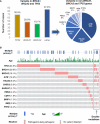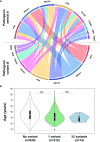Double heterozygous pathogenic variants prevalence in a cohort of patients with hereditary breast cancer
- PMID: 36003761
- PMCID: PMC9393394
- DOI: 10.3389/fonc.2022.873395
Double heterozygous pathogenic variants prevalence in a cohort of patients with hereditary breast cancer
Abstract
Hereditary breast cancer (BC) corresponds to 5% of all BC and a larger parcel of early-onset disease. The incorporation of next-generation sequencing (NGS) techniques reduced the cost of molecular testing and allowed the inclusion of additional cancer predisposition genes in panels that are more comprehensive. This enabled the identification of germline pathogenic variants in carriers and the introduction of risk-reducing strategies. It also resulted in the identification of the co-occurrence of more than one germline pathogenic variant in BC genes in some families. This is a rare event, and there are few reports on its impact on cancer risk. We conducted a single-institution retrospective study in which 1,156 women with early onset BC and/or a family history of cancer were tested by a germline multi-gene hereditary cancer panel. Germline pathogenic variants in high- and/or moderate-penetrance BC genes were identified in 19.5% of the individuals (n = 226). The most frequent variants were found in TP53 (69 of 226; 55 of them represented by p.R337H), BRCA1 (47 of 226), and BRCA2 (41 of 226). Double heterozygous (DH) variants were detected in 14 cases, representing 1.2% of all individuals assessed. There were no significant differences in age of BC onset and risk for bilateral BC in DH carriers when compared with those with one germline variant.
Keywords: NGS; breast cancer; double heterozygous variants; germline panels; hereditary breast cancer.
Copyright © 2022 Megid, Barros-Filho, Pisani and Achatz.
Conflict of interest statement
The authors declare that the research was conducted in the absence of any commercial or financial relationships that could be construed as a potential conflict of interest.
Figures




References
-
- Garritano S, Gemignani F, Palmero EI, Olivier M, Martel-Planche G, Le Calvez-Kelm F, et al. . Detailed haplotype analysis at the TP53 locus in p.R337H mutation carriers in the population of southern Brazil: evidence for a founder effect. Hum Mutat (2010) 31(2):143–50. doi: 10.1002/humu.21151 - DOI - PubMed
LinkOut - more resources
Full Text Sources
Research Materials
Miscellaneous

